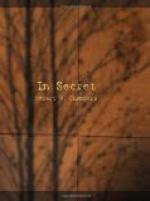The girl was so pretty in her youth’s clothing; her delicate ankles and white knees bare between the conventional thigh-length of green embossed leather breeches, rough green stockings, and fleece-lined hob-nailed shoes. And over the boy’s shirt the mountaineer’s frieze jacket!—with staghorn buttons. And the rough wool cuff fell on the hands of a duchess!—pistols at either hip, and a murderous Bavarian knife in front.
Glancing up at him where he stood under the red pine beside her: “I’ll do the dishes presently,” she said.
“I’ll do them,” he remarked, his eyes involuntarily seeking her hands.
A pink flush grew on her weather-tanned face—or perhaps it was the reddening sunlight stealing through some velvet piny space in the forest barrier. If it was a slight blush in recognition of his admiration she wondered at her capacity for blushing. However, Marie Antoinette coloured from temple to throat on the scaffold. But the girl knew that the poor Queen’s fate was an enviable one compared to what awaited her if she fell into the hands of the Hun.
McKay seated himself near her. The sunny silence of the mountains was intense. Over a mass of alpine wild flowers hanging heavy and fragrant between rocky clefts two very large and intensely white butterflies fought a fairy battle for the favours of a third—a dainty, bewildering creature, clinging to an unopened bud, its snowy wings a-quiver.
The girl’s golden eyes noted the pretty courtship, and her side glance rested on the little bride to be with an odd, indefinite curiosity, partly interrogative, partly disdainful.
It seemed odd to the girl that in this Alpine solitude life should be encountered at all. And as for life’s emotions, the frail, frivolous, ephemeral fury of these white-winged ghosts of daylight, embattled and all tremulous with passion, seemed exquisitely amazing to her here between the chaste and icy immobility of white-veiled peaks and the terrific twilight of the world’s depths below.
McKay, studying the papers, glanced up at Miss Erith. A bar of rosy sunset light slanted almost level between them.
“There seems to be,” he said slowly, “only one explanation for what you and I read here. The Boche has had his filthy fist on the throat of Switzerland for fifty years.”
“And what is ‘Les Errues’ to which these documents continually refer?” asked the girl.
“Les Errues is the twenty-seventh canton of Switzerland. It is the strip of forest and crag which includes all the northeastern region below Mount Terrible. It is a canton, a secret canton unrepresented in the Federal Assembly—a region without human population—a secret slice of Swiss wilderness owned by Germany!”
“Kay, do you believe that?”
“I am sure of it now. It is that wilderness into which I stumbled. It overlooks the terrain in Alsace where for fifty years the Hun has been busy day and night with his sinister, occult operations. Its entrance, if there be any save by the way of avalanches—the way I entered—must be guarded by the Huns; its only exit into Hunland. That is Les Errues. That is the region which masks the Great Secret of the Hun.”




